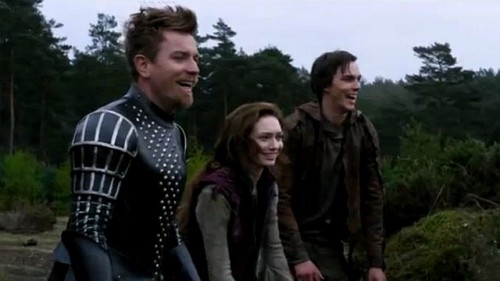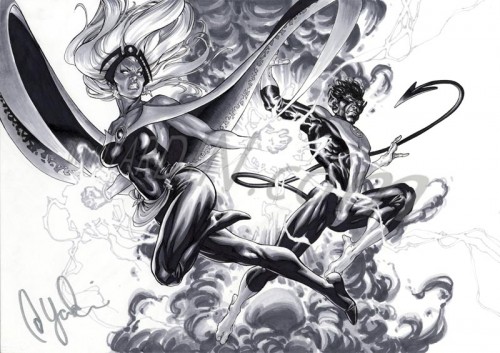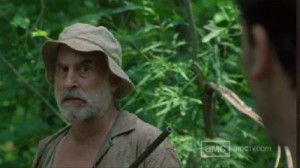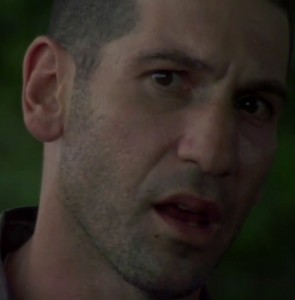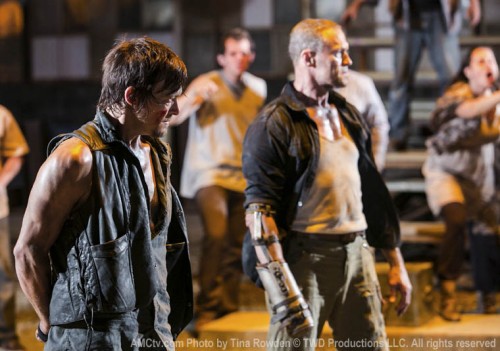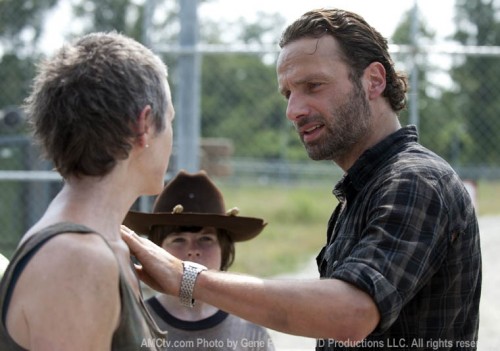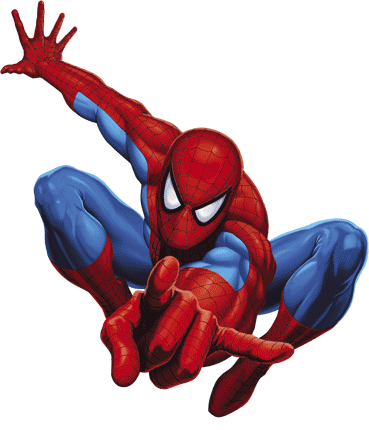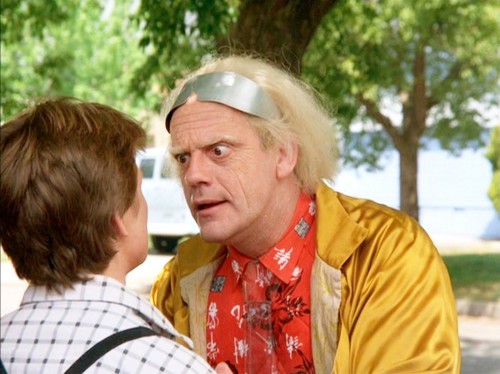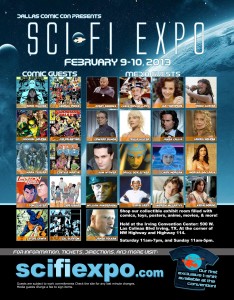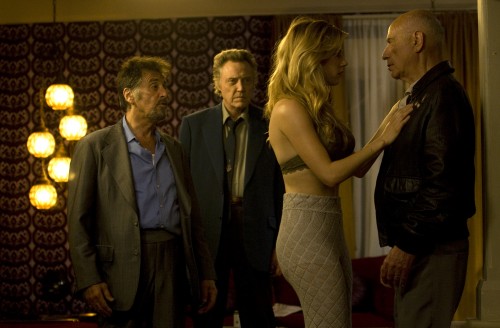
Photo credit Saeed Adyani, Roadside Attractions
Stand Up Guys starring Al Pacino, Christopher Walken, and Alan Arkin, is about a group of aging con men who get back together for one last hurrah. Director Fisher Stevens spent some time with a group of us on a livestream Q&A session. With such a legendary cast, naturally the questions gravitated towards Walken and Pacino, but Stevens also discusses the script and some inspirations for the film.
The film is a fun romp, with a lot of “old man” humor to it, but just like Stevens says in the interview, it packs a powerful message. You can see the film is in theaters now.
Livestream Q&A:
Can you say something about how you directed Christopher Walken? Were there any differences between approach with Pacino and Walken?
Stevens: I have directed Chris and Al in different ways. Before we started shooting, I knew Al much better than Chris and I spent a bit more time going over the script at the beginning with Al. So I felt a bit more at ease directing Al at first. With Chris, I had to feel my way around at the beginning but they both welcomed direction. However, sometimes they would disagree with me. But ultimately, they would always try one the way I wanted it, the way I liked it. They ultimately gave me many different varieties of takes.
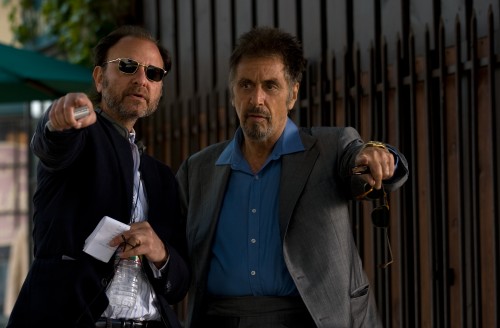
Director Fisher Stevens (left) and Al Pacino (right) on the set of STAND UP GUYS.
Photo Credit: Saeed Adyani, Roadside Attractions
How tough was it for you to get Al and Christopher to agree to the roles?
Stevens: When I started the movie, Al and Chris told me that they had done a reading a few years earlier of a different version of the script. Al played Doc, Chris Played Val. So when I called Chris to say I was directing the film, he asked who was going to play Doc and expressed interest in playing Doc himself. He said he really enjoys that role because as he is getting older, he enjoys playing grandfathers.
So I went in a round about way to try and get someone else to play opposite Chris, not going to my friend Al Pacino, because I was told he wasn’t interested. I kept sort of striking out until my phone rang one day and it was Al calling me after he had seen a Woody Allen documentary I had executive produced and asked me to work on the doc with him. And I said, “No, I don’t want to work on a documentary with you. I want you to read Stand Up Guys again and consider being in it with me directing.” There was a long pause and Al said, “You’re directing?” And I said, “Yeah,” and he read it and said, “Of course.” 4 weeks later we were in pre-production with Al and Chris.
The first person I thought of for Hirsch was Alan Arkin. I had worked with him as an actor in the film ‘Four Days in September’ 20 years ago. I guess because Chris and Al were already attached to the film, it peaked Arkin’s interest and thank God he said yes. It was like a dream come true.
What about the female characters?
Stevens: I auditioned all of the female characters, except Julianna Margulies, who I had worked with in the NY theatre scene. The other girls I auditioned — I saw Lucy Punch in a Woody Allen film and I knew of Vanessa Ferlito from NY theatre. But Addison Timlin was a discovery to me. She knocked the audition out of the park.
What films were the primary inspirations behind Stand Up Guys?
Stevens: I was inspired by many films from the 1970s including Dog Day Afternoon, Five Easy Pieces, Straight Time, and The Dirty Dozen. I loved the films from the 70s because they were about characters and not so much about big plot points and big set pieces. I made sure there were no cell phones, no computers, nothing very modern in Stand Up Guys except for the car they steal. Most of the clothes were vintage that the actors wore. The colors were muted. It was like time had forgotten this town and these people.
Was there ever thought of an alternate ending and will it be on the DVD?
Stevens: That was always the ending, but that wasn’t the ending in the script. In the script, after Chris Walken says, “I’m all out of gum,” the two characters just walk into the building and the camera pans up to nothing, to blank sky. We added the gunshots and the painting – we opened with the painting, it’s more poetic to close w/ a panting – and when you have Pacino and Walken in your movie, they have to go out firing and you still leave it up to the audience’s imagination of what happened.
I’m going to go admittedly shallow here… because I was a fan of ‘Early Edition.’ Any plans to collaborate with Kyle Chandler? You both seem to have found steady success in both TV and film.
Stevens: Kyle Chandler has turned into a fine actor and I would love to work with him again someday. But not on a sequel to ‘Early Edition.’
Pacino and Walked are not trying to be funny — the comedy comes from the situations. Did you instruct them to play it more naturally?
Stevens: Yeah, it was important to ground this entire script in reality. That was the only way for it to work. We rehearsed and had long discussions about keeping everything real, even when it comes to these hyper-blown situations. Fortunately, I had the greatest actors in the world to work with and they only know how to do things real. When it felt false, we did another take.
Have your experiences as an actor helped you with directing? Knowing what it’s like from both sides of the fence, or does it make it a little more difficult?
Stevens: Yes, being an actor absolutely helped me direct — especially directing actors of this caliber. I think they had an inherent trust in me that saved me a lot of steps in earning it. The other thing about Alan Arkin, Chris Walken, and Al Pacino is that they all come from the theatre, as do I, so we shared a common language.
Was it as much fun as it looked?
Stevens: Yes, it was incredibly fun. Sometimes I would get lost just watching them act and forget I was directing. It was also a lot of work, but I would gladly do it again.
Can you talk a bit about the script? What were its origins? How did you come across it?
Stevens: The script came about because the writer Noah Haidle was riding his bike in Coney Island one day and saw three old gangster-type looking guys sitting on a park bench drinking coffee out of paper cups. He was imaging what their lives were like and this is what he came up with.
I was sent the script years later, made a bunch of tweaks and changes with Noah and with the producer Tom Rosenberg, and that is the film you’re seeing.
And the actors of course chimed in. One scene was completely improvised — the scene in the whore house where Al and Chris talk about penis enhancement. I overheard them having this discussion about mutual friends and then said, “We have to get this on film.” So we did.
Is there an ultimate message the film or you wanted to convey to the audience?
Stevens: I think the ultimate message to the film is to live life to the fullest everyday. Whether it’s your last or it’s not, being a loyal friend is more important than almost anything.

